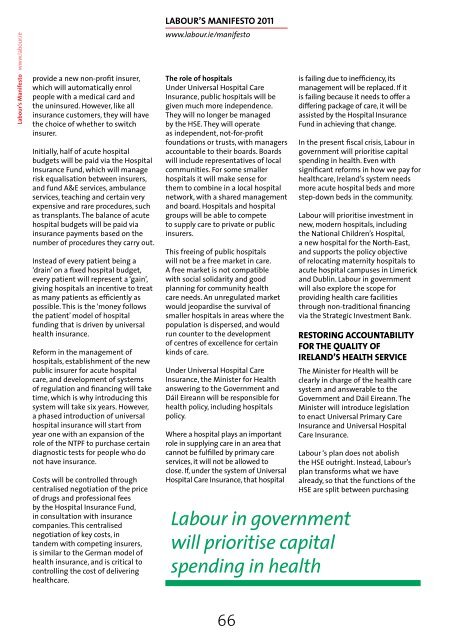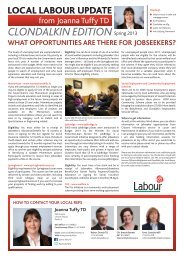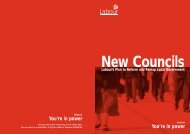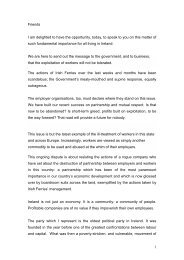Labour's Manifesto - The Labour Party
Labour's Manifesto - The Labour Party
Labour's Manifesto - The Labour Party
Create successful ePaper yourself
Turn your PDF publications into a flip-book with our unique Google optimized e-Paper software.
<strong>Labour</strong>’s <strong>Manifesto</strong> www.labour.ie<br />
provide a new non-profit insurer,<br />
which will automatically enrol<br />
people with a medical card and<br />
the uninsured. However, like all<br />
insurance customers, they will have<br />
the choice of whether to switch<br />
insurer.<br />
Initially, half of acute hospital<br />
budgets will be paid via the Hospital<br />
Insurance Fund, which will manage<br />
risk equalisation between insurers,<br />
and fund A&E services, ambulance<br />
services, teaching and certain very<br />
expensive and rare procedures, such<br />
as transplants. <strong>The</strong> balance of acute<br />
hospital budgets will be paid via<br />
insurance payments based on the<br />
number of procedures they carry out.<br />
Instead of every patient being a<br />
‘drain’ on a fixed hospital budget,<br />
every patient will represent a ‘gain’,<br />
giving hospitals an incentive to treat<br />
as many patients as efficiently as<br />
possible. This is the ‘money follows<br />
the patient’ model of hospital<br />
funding that is driven by universal<br />
health insurance.<br />
Reform in the management of<br />
hospitals, establishment of the new<br />
public insurer for acute hospital<br />
care, and development of systems<br />
of regulation and financing will take<br />
time, which is why introducing this<br />
system will take six years. However,<br />
a phased introduction of universal<br />
hospital insurance will start from<br />
year one with an expansion of the<br />
role of the NTPF to purchase certain<br />
diagnostic tests for people who do<br />
not have insurance.<br />
Costs will be controlled through<br />
centralised negotiation of the price<br />
of drugs and professional fees<br />
by the Hospital Insurance Fund,<br />
in consultation with insurance<br />
companies. This centralised<br />
negotiation of key costs, in<br />
tandem with competing insurers,<br />
is similar to the German model of<br />
health insurance, and is critical to<br />
controlling the cost of delivering<br />
healthcare.<br />
<strong>Labour</strong>’s manifesto 2011<br />
www.labour.ie/manifesto<br />
<strong>The</strong> role of hospitals<br />
Under Universal Hospital Care<br />
Insurance, public hospitals will be<br />
given much more independence.<br />
<strong>The</strong>y will no longer be managed<br />
by the HSE. <strong>The</strong>y will operate<br />
as independent, not-for-profit<br />
foundations or trusts, with managers<br />
accountable to their boards. Boards<br />
will include representatives of local<br />
communities. For some smaller<br />
hospitals it will make sense for<br />
them to combine in a local hospital<br />
network, with a shared management<br />
and board. Hospitals and hospital<br />
groups will be able to compete<br />
to supply care to private or public<br />
insurers.<br />
This freeing of public hospitals<br />
will not be a free market in care.<br />
A free market is not compatible<br />
with social solidarity and good<br />
planning for community health<br />
care needs. An unregulated market<br />
would jeopardise the survival of<br />
smaller hospitals in areas where the<br />
population is dispersed, and would<br />
run counter to the development<br />
of centres of excellence for certain<br />
kinds of care.<br />
Under Universal Hospital Care<br />
Insurance, the Minister for Health<br />
answering to the Government and<br />
Dáil Eireann will be responsible for<br />
health policy, including hospitals<br />
policy.<br />
Where a hospital plays an important<br />
role in supplying care in an area that<br />
cannot be fulfilled by primary care<br />
services, it will not be allowed to<br />
close. If, under the system of Universal<br />
Hospital Care Insurance, that hospital<br />
<strong>Labour</strong> in government<br />
will prioritise capital<br />
spending in health<br />
is failing due to inefficiency, its<br />
management will be replaced. If it<br />
is failing because it needs to offer a<br />
differing package of care, it will be<br />
assisted by the Hospital Insurance<br />
Fund in achieving that change.<br />
In the present fiscal crisis, <strong>Labour</strong> in<br />
government will prioritise capital<br />
spending in health. Even with<br />
significant reforms in how we pay for<br />
healthcare, Ireland’s system needs<br />
more acute hospital beds and more<br />
step-down beds in the community.<br />
<strong>Labour</strong> will prioritise investment in<br />
new, modern hospitals, including<br />
the National Children’s Hospital,<br />
a new hospital for the North-East,<br />
and supports the policy objective<br />
of relocating maternity hospitals to<br />
acute hospital campuses in Limerick<br />
and Dublin. <strong>Labour</strong> in government<br />
will also explore the scope for<br />
providing health care facilities<br />
through non-traditional financing<br />
via the Strategic Investment Bank.<br />
Restoring accountability<br />
for the quality of<br />
Ireland’s health service<br />
<strong>The</strong> Minister for Health will be<br />
clearly in charge of the health care<br />
system and answerable to the<br />
Government and Dáil Eireann. <strong>The</strong><br />
Minister will introduce legislation<br />
to enact Universal Primary Care<br />
Insurance and Universal Hospital<br />
Care Insurance.<br />
<strong>Labour</strong> ‘s plan does not abolish<br />
the HSE outright. Instead, <strong>Labour</strong>’s<br />
plan transforms what we have<br />
already, so that the functions of the<br />
HSE are split between purchasing<br />
66
















